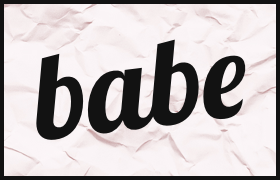
My sibling doesn’t identify with gender pronouns
And I love them no matter what
I remember wandering the aisles of Costco searching for free samples with my younger sister, Molly, when I was in middle school. As a worker handed me one, she asked, “Would your brother like one too?”
Now, I knew she had made an honest mistake – my sister did have short hair and was wearing a men’s sweatshirt, but I was so shocked and even embarrassed she had mistaken my sister’s identity. Just recently, however, did I discover I had been making the same mistake for most of my life.
I got a text from my brother a couple weeks ago saying “Look at Molly’s Finsta.” I opened Instagram to see my sister’s post: a picture of a T-shirt with the words “They, Them, Their, Themselves” and a caption “Someone get me this shirt cuz not everyone has the memo that I go by them/they pronouns.”
This came as a complete surprise to me, because I had no idea Molly wanted to be addressed this way.
I talked to them as soon as I saw this, and I learned they identify as genderqueer. Even though I didn’t know this before, I completely respect and support their choice.
I knew this is not an easy thing to share with people, but I am determined to be someone they can turn to for support. Most importantly, I want to show them I would be understanding and supportive through all of this.
They have always been the silliest, most sarcastic sibling who could never fail to make me crack-up. Obviously, addressing them differently was not going to change who they are and what they mean to me.
After talking to them, I learned what it meant to them to identify as genderqueer. People who are genderqueer often times use gender neutral pronouns.
For example, instead of saying “He went to the park,” you would say, “They went to the park.” A lot of times people who are non-binary go by different names or nicknames. In my sibling’s case, the name Molly was given to them by our parents at birth, but now they just go by our last name, “Jensen.”
For Jensen, being gender-neutral is the same as anyone else being female or male: it’s just who they are. Sometimes they feel more masculine, other times they feel more feminine, and sometimes it’s something in between.
For them, it depends on who they are with, how they are feeing, or what their impulse is at the moment. Not everyone who identifies as gender neutral feels this way, but learning about what it meant to Jensen allowed me to address them in the the most correct and considerate way.
They have always felt like they were neither male nor female, but accepted they were female, because they didn’t really know about gender identity.
They made the connection that gender is different than sex, allowing them to embrace their true identity. They describe it as a breath of fresh air, knowing they can be themself in the best possible way.
They say not only does the use of correct pronouns and preferred name boost their self-esteem and confidence, but it makes them feel accepted and not different from anyone else.
Finding out about this couldn’t make me happier. It’s the best feeling to know someone I love can finally be their true self, and it’s important to me to be able to change my perspective and address Jensen how they want.
I probably will slip up from time to time and use the wrong pronoun, but I will always try to make them feel the most comfortable with themselves as they can be. The whole thing is a process, but it’s one I couldn’t be more excited about. Jensen inspires me to embrace identity, and I will love and support them no matter what.
